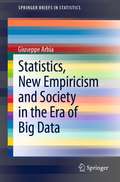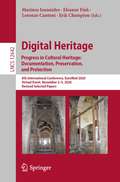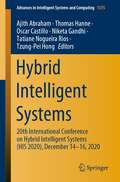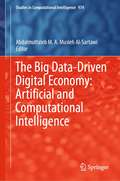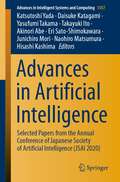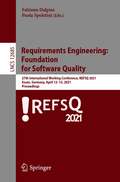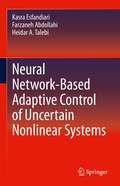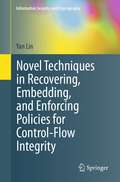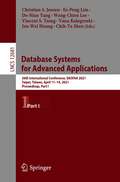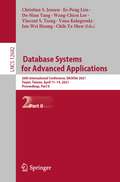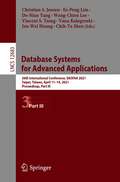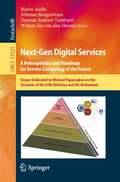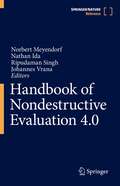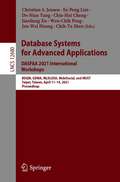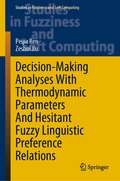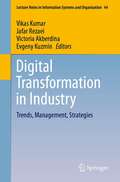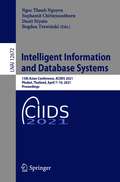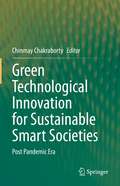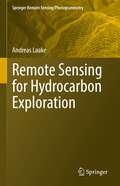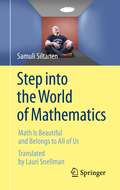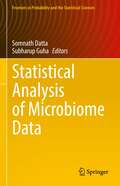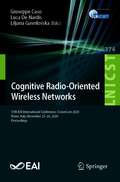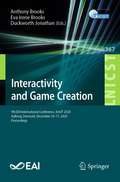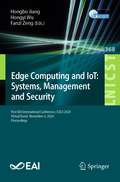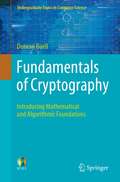- Table View
- List View
Statistics, New Empiricism and Society in the Era of Big Data (SpringerBriefs in Statistics)
by Giuseppe ArbiaThis book reveals the myriad aspects of Big Data collection and analysis, by defining and clarifying the meaning of Big Data and its unique characteristics in a non-technical and easy-to-follow way. Moreover, it discusses critical issues and problems related to the Big Data revolution and their implications for both Statistics as a discipline and for our everyday lives. The author identifies various problems and limitations in the quantitative analysis of Big Data, with regard to e.g. its volume, velocity and variety, as well as its reliability and veridicity. Dedicated chapters focus on the epistemological aspects of data-based knowledge and ethical aspects of the use of Big Data, while also addressing paradigmatic cases such as Cambridge Analytica and the use of data from social networks to influence election outcomes.
Digital Heritage. Progress in Cultural Heritage: 8th International Conference, EuroMed 2020, Virtual Event, November 2–5, 2020, Revised Selected Papers (Lecture Notes in Computer Science #12642)
by Marinos Ioannides Eleanor Fink Lorenzo Cantoni Erik ChampionThis book constitutes the refereed post-conference proceedings of the 8th International Conference on Digital Heritage, EuroMed 2020, held virtually in November 2020.The 37 revised project papers and 30 revised short papers presented were carefully reviewed and selected from 326 submissions. The papers are on topics such as digital data acquisition technologies in CH/2D and 3D data capture methodologies and data processing; remote sensing for archaeology and cultural heritage management and monitoring; interactive environments and applications; reproduction techniques and rapid prototyping in CH; e-Libraries and e-Archives in cultural heritage; virtual museum applications (e-Museums and e-Exhibitions); visualisation techniques (desktop, virtual and augmented reality); storytelling and authoring tools; tools for education; 2D and 3D GIS in cultural heritage; and on-site and remotely sensed data collection.
Hybrid Intelligent Systems: 20th International Conference on Hybrid Intelligent Systems (HIS 2020), December 14-16, 2020 (Advances in Intelligent Systems and Computing #1375)
by Ajith Abraham Thomas Hanne Oscar Castillo Niketa Gandhi Tatiane Nogueira Rios Tzung-Pei HongThis book highlights the recent research on hybrid intelligent systems and their various practical applications. It presents 58 selected papers from the 20th International Conference on Hybrid Intelligent Systems (HIS 2020) and 20 papers from the 12th World Congress on Nature and Biologically Inspired Computing (NaBIC 2020), which was held online, from December 14 to 16, 2020. A premier conference in the field of artificial intelligence, HIS - NaBIC 2020 brought together researchers, engineers and practitioners whose work involves intelligent systems, network security and their applications in industry. Including contributions by authors from 25 countries, the book offers a valuable reference guide for all researchers, students and practitioners in the fields of science and engineering.
The Big Data-Driven Digital Economy: Artificial and Computational Intelligence (Studies in Computational Intelligence #974)
by Abdalmuttaleb M. A. Musleh Al-SartawiThis book shows digital economy has become one of the most sought out solutions to sustainable development and economic growth of nations. This book discusses the implications of both artificial intelligence and computational intelligence in the digital economy providing a holistic view on AI education, economics, finance, sustainability, ethics, governance, cybersecurity, blockchain, and knowledge management. Unlike other books, this book brings together two important areas, intelligence systems and big data in the digital economy, with special attention given to the opportunities, challenges, for education, business growth, and economic progression of nations. The chapters hereby focus on how societies can take advantage and manage data, as well as the limitations they face due to the complexity of resources in the form of digital data and the intelligence which will support economists, financial managers, engineers, ICT specialists, digital managers, data managers, policymakers, regulators, researchers, academics, students, economic development strategies, and the efforts made by the UN towards achieving their sustainability goals.
Advances in Artificial Intelligence: Selected Papers from the Annual Conference of Japanese Society of Artificial Intelligence (JSAI 2020) (Advances in Intelligent Systems and Computing #1357)
by Katsutoshi Yada Daisuke Katagami Yasufumi Takama Takayuki Ito Akinori Abe Eri Sato-Shimokawara Junichiro Mori Naohiro Matsumura Hisashi KashimaThis book contains expanded versions of research papers presented at the international sessions of Annual Conference of the Japanese Society for Artificial Intelligence (JSAI), which was held online in June 2020. The JSAI annual conferences are considered key events for our organization, and the international sessions held at these conferences play a key role for the society in its efforts to share Japan’s research on artificial intelligence with other countries. In recent years, AI research has proved of great interest to business people. The event draws both more and more presenters and attendees every year, including people of diverse backgrounds such as law and the social sciences, in additional to artificial intelligence. We are extremely pleased to publish this collection of papers as the research results of our international sessions.
Requirements Engineering: 27th International Working Conference, REFSQ 2021, Essen, Germany, April 12–15, 2021, Proceedings (Lecture Notes in Computer Science #12685)
by Fabiano Dalpiaz Paola SpoletiniThis book constitutes the proceedings of the 27th International Working Conference on Requirements Engineering - Foundation for Software Quality, REFSQ 2021, which was due to be held in Essen, Germany, in April 2021. Due to the COVID-19 pandemic the conference was held virtually in April 2021. The special focus of this year`s REFSQ 2021 conference are contributions emphasizing the importance of human values, such as privacy and fairness, when designing software-intensive systems as well as the challenges that intelligent and autonomous systems pose due to the tight interplay with humans.
Neural Network-Based Adaptive Control of Uncertain Nonlinear Systems
by Kasra Esfandiari Farzaneh Abdollahi Heidar A. TalebiThe focus of this book is the application of artificial neural networks in uncertain dynamical systems. It explains how to use neural networks in concert with adaptive techniques for system identification, state estimation, and control problems. The authors begin with a brief historical overview of adaptive control, followed by a review of mathematical preliminaries. In the subsequent chapters, they present several neural network-based control schemes. Each chapter starts with a concise introduction to the problem under study, and a neural network-based control strategy is designed for the simplest case scenario. After these designs are discussed, different practical limitations (i.e., saturation constraints and unavailability of all system states) are gradually added, and other control schemes are developed based on the primary scenario. Through these exercises, the authors present structures that not only provide mathematical tools for navigating control problems, but also supply solutions that are pertinent to real-life systems.
Novel Techniques in Recovering, Embedding, and Enforcing Policies for Control-Flow Integrity (Information Security and Cryptography)
by Yan LinThere are three fundamental components in Control-Flow Integrity (CFI) enforcement. The first component is accurately recovering the policy (CFG). Usually, the more precise the policy is, the more security CFI improves, but precise CFG generation was considered hard without the support of source code. The second component is embedding the CFI policy securely. Current CFI enforcement usually inserts checks before indirect branches to consult a read-only table which stores the valid CFG information. However, this kind of read-only table can be overwritten by some kinds of attacks (e.g., the Rowhammer attack and data-oriented programming). The third component is to efficiently enforce the CFI policy. In current approaches CFI checks are always executed whenever there is an indirect control flow transfer. Therefore, it is critical to minimize the performance impact of CFI checks.In this book, we propose novel solutions to handle these three fundamental components. To generate a precise CFI policy without the support of the source code, we systematically study two methods which recover CFI policy based on function signature matching at the binary level and propose our novel rule- and heuristic-based mechanism to more accurately recover function signature. To embed CFI policy securely, we design a novel platform which encodes the policy into the machine instructions directly without relying on consulting any read-only data structure, by making use of the idea of instruction-set randomization. Each basic block is encrypted with a key derived from the CFG. To efficiently enforce CFI policy, we make use of a mature dynamic code optimization platform called DynamoRIO to enforce the policy so that we are only required to do the CFI check when needed.
Database Systems for Advanced Applications: 26th International Conference, DASFAA 2021, Taipei, Taiwan, April 11–14, 2021, Proceedings, Part I (Lecture Notes in Computer Science #12681)
by Christian S. Jensen Ee-Peng Lim De-Nian Yang Wang-Chien Lee Vincent S. Tseng Vana Kalogeraki Jen-Wei Huang Chih-Ya ShenThe three-volume set LNCS 12681-12683 constitutes the proceedings of the 26th International Conference on Database Systems for Advanced Applications, DASFAA 2021, held in Taipei, Taiwan, in April 2021. The total of 156 papers presented in this three-volume set was carefully reviewed and selected from 490 submissions. The topic areas for the selected papers include information retrieval, search and recommendation techniques; RDF, knowledge graphs, semantic web, and knowledge management; and spatial, temporal, sequence, and streaming data management, while the dominant keywords are network, recommendation, graph, learning, and model. These topic areas and keywords shed the light on the direction where the research in DASFAA is moving towards. Due to the Corona pandemic this event was held virtually.
Database Systems for Advanced Applications: 26th International Conference, DASFAA 2021, Taipei, Taiwan, April 11–14, 2021, Proceedings, Part II (Lecture Notes in Computer Science #12682)
by Ee-Peng Lim Vincent S. Tseng Christian S. Jensen De-Nian Yang Jen-Wei Huang Chih-Ya Shen Wang-Chien Lee Vana KalogerakiThe three-volume set LNCS 12681-12683 constitutes the proceedings of the 26th International Conference on Database Systems for Advanced Applications, DASFAA 2021, held in Taipei, Taiwan, in April 2021. The total of 156 papers presented in this three-volume set was carefully reviewed and selected from 490 submissions. The topic areas for the selected papers include information retrieval, search and recommendation techniques; RDF, knowledge graphs, semantic web, and knowledge management; and spatial, temporal, sequence, and streaming data management, while the dominant keywords are network, recommendation, graph, learning, and model. These topic areas and keywords shed the light on the direction where the research in DASFAA is moving towards. Due to the Corona pandemic this event was held virtually.
Database Systems for Advanced Applications: 26th International Conference, DASFAA 2021, Taipei, Taiwan, April 11–14, 2021, Proceedings, Part III (Lecture Notes in Computer Science #12683)
by Christian S. Jensen Ee-Peng Lim De-Nian Yang Wang-Chien Lee Vincent S. Tseng Vana Kalogeraki Jen-Wei Huang Chih-Ya ShenThe three-volume set LNCS 12681-12683 constitutes the proceedings of the 26th International Conference on Database Systems for Advanced Applications, DASFAA 2021, held in Taipei, Taiwan, in April 2021. The total of 156 papers presented in this three-volume set was carefully reviewed and selected from 490 submissions. The topic areas for the selected papers include information retrieval, search and recommendation techniques; RDF, knowledge graphs, semantic web, and knowledge management; and spatial, temporal, sequence, and streaming data management, while the dominant keywords are network, recommendation, graph, learning, and model. These topic areas and keywords shed the light on the direction where the research in DASFAA is moving towards. Due to the Corona pandemic this event was held virtually.
Next-Gen Digital Services. A Retrospective and Roadmap for Service Computing of the Future: Essays Dedicated to Michael Papazoglou on the Occasion of His 65th Birthday and His Retirement (Lecture Notes in Computer Science #12521)
by Marco Aiello Athman Bouguettaya Damian Andrew Tamburri Willem-Jan van den HeuvelThis book is a festschrift in honour of Mike Papazoglou’s 65th birthday and retirement. It includes 20 contributions from leading researchers who have worked with Mike in his more than 40 years of academic research. Topics are as varied as Mike’s and include service engineering, service management, services and human, IoT, and data-driven services.
Handbook of Nondestructive Evaluation 4.0
by Nathan Ida Ripudaman Singh Norbert Meyendorf Johannes VranaThis handbook comprehensively covers the cutting-edge trends and techniques essential for the integration of nondestructive evaluation (NDE) into the changing face of the modern industrial landscape. In particular, it delves into the marriage of NDE with new techniques in e.g. data mining, cloud computing and autonomous operation, highlighting the potential for cyber-physical controlled production and discussing the myriad possible applications across many different industries.The Handbook of NDE 4.0 centers around the Internet of Things and Industry 4.0 – the next generation of industrial production encompassing all aspects of networking across all industrial areas. It discusses the adaptation of existing NDE techniques to emerging new technological areas, such as 3D printing, via the introduction of cyber systems into the inspection and maintenance processes. In addition, the handbook covers topics such as the management and processing of big data with respect to real-time monitoring of structural integrity and reliable inspection of individual components. Remote NDE to include competence not available on-site will be a potential technique to increase reliability of NDE inspections by integrating additional specialist inputs into the decision process by methods such as telepresence, thereby better leveraging the scarce resources of senior inspectors into industrial inspections at multiple sites.The handbook houses a wealth of essential information to help academics, industry professionals and entrepreneurs navigate through this burgeoning new field. The material in this handbook is presented with the intention of ultimately improving human safety through reliable inspections and dependable maintenance of critical infrastructure, while also enhancing business value through reduced downtime, affordable maintenance, and talent optimization.
Database Systems for Advanced Applications. DASFAA 2021 International Workshops: BDQM, GDMA, MLDLDSA, MobiSocial, and MUST, Taipei, Taiwan, April 11–14, 2021, Proceedings (Lecture Notes in Computer Science #12680)
by Christian S. Jensen Ee-Peng Lim De-Nian Yang Chia-Hui Chang Jianliang Xu Wen-Chih Peng Jen-Wei Huang Chih-Ya ShenThis volume constitutes the papers of several workshops which were held in conjunction with the 26th International Conference on Database Systems for Advanced Applications, DASFAA 2021, held in Taipei, Taiwan, in April 2021. The 29 revised full papers presented in this book were carefully reviewed and selected from 84 submissions. DASFAA 2021 presents the following five workshops: 6th International Workshop on Big Data Quality Management (BDQM 2021)5th International Workshop on Graph Data Management and Analysis (GDMA 2021) First International Workshop on Machine Learning and Deep Learning for Data Security Applications (MLDLDSA 2021)6th International Workshop on Mobile Data Management, Mining, and Computing on Social Network (MobiSocial 2021)2021 International Workshop on Mobile Ubiquitous Systems and Technologies (MUST 2021)Due to the Corona pandemic this event was held virtually.
Decision-Making Analyses with Thermodynamic Parameters and Hesitant Fuzzy Linguistic Preference Relations (Studies in Fuzziness and Soft Computing #409)
by Peijia Ren Zeshui XuThe book introduces readers to some of the latest advances in and approaches to decision-making methods based on thermodynamic characters and hesitant fuzzy linguistic preference relations. By investigating the decision-making methods with thermodynamic parameters based on different information representatives, the book offers readers a novel perspective for solving problems under uncertainty. By exploring the consistency and consensus of hesitant fuzzy linguistic preference relations, the book gives readers efficient ways for preference analysis under uncertainty, chiefly intended for researchers and practitioners working in operations research, multi-attribute decision making, preference analysis, etc. The book can also be used as supplementary material for postgraduate and senior-year undergraduate students of the relevant professional institutions.
Digital Transformation in Industry: Trends, Management, Strategies (Lecture Notes in Information Systems and Organisation #44)
by Vikas Kumar Jafar Rezaei Victoria Akberdina Evgeny KuzminThis book offers a selection of the best papers presented at the international scientific conference "Digital Transformation in Industry: Trends, Management, Strategies", held by the Institute of Economics of the Ural Branch of the Russian Academy of Sciences, Russia in November 2020. The main focus of the book is to evaluate trends and perspectives of digital transformation in industry and industrial markets through the dissemination of Industry 4.0. The aim of the topics discussed is to create an idea of introduction mechanisms for digitization processes and to specify successful strategies of digital transformation in all sectors of industrial enterprises. The experience of developed and developing economies, as well as small and large enterprises implementing IT and other technological innovations are included. Students as well as managers of industrial organizations alike can benefit from the results of the topics covered.
Intelligent Information and Database Systems: 13th Asian Conference, ACIIDS 2021, Phuket, Thailand, April 7–10, 2021, Proceedings (Lecture Notes in Computer Science #12672)
by Ngoc Thanh Nguyen Suphamit Chittayasothorn Dusit Niyato Bogdan TrawińskiThis book constitutes the refereed proceedings of the 13th Asian Conference on Intelligent Information and Database Systems, ACIIDS 2021, held in Phuket, Thailand, in April 2021.*The 67 full papers accepted for publication in these proceedings were carefully reviewed and selected from 291 submissions. The papers of the first volume are organized in the following topical sections: data mining methods and applications; machine learning methods; decision support and control systems; natural language processing; cybersecurity intelligent methods; computer vision techniques; computational imaging and vision; advanced data mining techniques and applications; intelligent and contextual systems; commonsense knowledge, reasoning and programming in artificial intelligence; data modelling and processing for industry 4.0; innovations in intelligent systems. *The conference was held virtually.
Green Technological Innovation for Sustainable Smart Societies: Post Pandemic Era
by Chinmay ChakrabortyThis book discusses the innovative and efficient technological solutions for sustainable smart societies in terms of alteration in industrial pollution levels, the effect of reduced carbon emissions, green power management, ecology, and biodiversity, the impact of minimal noise levels and air quality influences on human health. The book is focused on the smart society development using innovative low-cost advanced technology in different areas where the growth in employment and income are driven by public and private investment into such economic activities, infrastructure and assets that allow reduced carbon emissions and pollution, enhanced energy, and resource efficiency and prevention of the loss of biodiversity and ecosystem services. The book also covers the paradigm shift in the sustainable development for the green environment in the post-pandemic era. It emphasizes and facilitates a greater understanding of existing available research i.e., theoretical, methodological, well-established and validated empirical work, associated with the environmental and climate change aspects.
Remote Sensing for Hydrocarbon Exploration (Springer Remote Sensing/Photogrammetry)
by Andreas LaakeThis book provides insights into the benefits of using remote sensing data from a geoscientist's perspective, by integrating the data with the understanding of Earth's surface and subsurface. In 3 sections, the book takes a detailed look at what data explorationists use when they explore for hydrocarbon resources, assess different terrain types for planning and hazards and extract present-day geologic analogs for subsurface geologic settings. The book presents the usage of remote sensing data in exploration in a structured way by detecting individual geologic features as building blocks for complex geologic systems. This concept enables readers to build their own workflows for the assessment of complex geologic systems using various combinations of remote sensing data. Section 1 introduces readers to the foundations of remote sensing for exploration, covers various methods of image processing and studies different digital elevation and bathymetry models. Section 2 presents the concept of geomorphology as a means to integrate surface and subsurface data. Different aspects of rendering in 2D and 3D are explained and used for the interpretation and extraction of geologic features that are used in exploration.Section 3 addresses remote sensing for hydrocarbon exploration in detail, from geophysical data acquisition to development and infrastructure planning. The organization of this chapter follows an exploration workflow from regional to local modeling studying basin and petroleum system modeling as well as logistics planning of seismic surveys and near-surface modeling. Aspects of field development and infrastructure planning comprise multi-temporal and dynamic modeling. The section closes with a structured approach to extracting geologic analogs from interpreted remote sensing data.The book will be of interest to professionals and students working in exploration for hydrocarbons and water resources, as well as geoscientists and engineers using remote sensing for infrastructure planning, hazard assessment and dynamic environmental studies.
Step into the World of Mathematics: Math Is Beautiful and Belongs to All of Us
by Samuli SiltanenModern life is increasingly relying on digital technology, which in turn runs on mathematics. However, this underlying math is hidden from us. That is mostly a good thing since we do not want to be solving equations and calculating fractions just to get things done in our everyday business. But the mathematical details do matter for anyone who wants to understand how stuff works, or wishes to create something new in the jungle of apps and algorithms. This book takes a look at the mathematical models behind weather forecasting, climate change prediction, artificial intelligence, medical imaging and computer graphics. The reader is expected to have only a curious mind; technical math skills are not needed for enjoying this text.
Statistical Analysis of Microbiome Data (Frontiers in Probability and the Statistical Sciences)
by Somnath Datta Subharup GuhaMicrobiome research has focused on microorganisms that live within the human body and their effects on health. During the last few years, the quantification of microbiome composition in different environments has been facilitated by the advent of high throughput sequencing technologies. The statistical challenges include computational difficulties due to the high volume of data; normalization and quantification of metabolic abundances, relative taxa and bacterial genes; high-dimensionality; multivariate analysis; the inherently compositional nature of the data; and the proper utilization of complementary phylogenetic information. This has resulted in an explosion of statistical approaches aimed at tackling the unique opportunities and challenges presented by microbiome data. This book provides a comprehensive overview of the state of the art in statistical and informatics technologies for microbiome research. In addition to reviewing demonstrably successful cutting-edge methods, particular emphasis is placed on examples in R that rely on available statistical packages for microbiome data. With its wide-ranging approach, the book benefits not only trained statisticians in academia and industry involved in microbiome research, but also other scientists working in microbiomics and in related fields.
Cognitive Radio-Oriented Wireless Networks: 15th EAI International Conference, CrownCom 2020, Rome, Italy, November 25-26, 2020, Proceedings (Lecture Notes of the Institute for Computer Sciences, Social Informatics and Telecommunications Engineering #374)
by Giuseppe Caso Luca De Nardis Liljana GavrilovskaThis book constitutes the refereed proceedings of the 15th International Conference on Cognitive Radio-Oriented Wireless Networks, CROWNCOM 2020, held in Rome, Italy, in November 2020. Due to COVID-19 pandemic the conference was held virtually. The 13 revised full papers were selected from 28 submissions and present all major technical aspects related to cognitive radio and networks. The papers are organized in four sessions: spectrum sensing and environment awareness; resource sharing and optimization; verticals and applications; business models and spectrum management.
Interactivity and Game Creation: 9th EAI International Conference, ArtsIT 2020, Aalborg, Denmark, December 10–11, 2020, Proceedings (Lecture Notes of the Institute for Computer Sciences, Social Informatics and Telecommunications Engineering #367)
by Anthony Brooks Eva Irene Brooks Duckworth JonathanThis book constitutes the refereed post-conference proceedings of the 9th International Conference on Interactivity and Game Creation, ArtsIT 2020, held in Aalborg, Denmark, in December 2020. Due to COVID-19 pandemic the conference was held virtually. The 28 revised full papers presented were carefully selected from 60 submissions. The papers represent a forum for the dissemination of cutting-edge research results in the area of arts, design and technology, including open related topics like interactivity and game creation. They are grouped in terms of content on art, installation and performance; games; design; intelligence and creativity in healthcare; wellbeing and aging.
Edge Computing and IoT: First EAI International Conference, ICECI 2020, Virtual Event, November 6, 2020, Proceedings (Lecture Notes of the Institute for Computer Sciences, Social Informatics and Telecommunications Engineering #368)
by Hongbo Jiang Hongyi Wu Fanzi ZengThis book constitutes the refereed post-conference proceedings of the First International Conference Edge Computing and IoT, ICECI 2020, held in November 2020 in Changsha, China. Due to COVID-19 pandemic the conference was held virtually. The rapidly increasing devices and data traffic in the Internet-of-Things (IoT) era are posing significant burdens on the capacity-limited Internet and uncontrollable service delay. The 11 full papers of ICECI 2020 were selected from 79 submissions and present results and ideas in the area of edge computing and IoT.
Fundamentals of Cryptography: Introducing Mathematical and Algorithmic Foundations (Undergraduate Topics in Computer Science)
by Duncan BuellCryptography, as done in this century, is heavily mathematical. But it also has roots in what is computationally feasible.This unique textbook text balances the theorems of mathematics against the feasibility of computation. Cryptography is something one actually “does”, not a mathematical game one proves theorems about. There is deep math; there are some theorems that must be proved; and there is a need to recognize the brilliant work done by those who focus on theory. But at the level of an undergraduate course, the emphasis should be first on knowing and understanding the algorithms and how to implement them, and also to be aware that the algorithms must be implemented carefully to avoid the “easy” ways to break the cryptography. This text covers the algorithmic foundations and is complemented by core mathematics and arithmetic.
